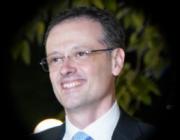Theodore Papaioannou is Professor of Biomedical Engineering and Director of the Department of Biomedical Engineering at the Medical School of the National and Kapodistrian University of Athens (NKUA).
He holds a Diploma in Mechanical Engineering from the National Technical University of Athens and a PhD from the Medical School, NKUA. He received postgraduate training at Computational Biomedicine Lab, Dept. of Computer Science, University of Houston and at the Laboratory of Hemodynamics and Cardiovascular Technology, Institute of Bioengineering, École Polytechnique Fédérale de Lausanne (EPFL) in the fields of medical image processing, cardiovascular modeling, arterial mechanics and validation of medical devices.
He served as Director of Department of History of Medicine and Medical Ethics, Medical School, NKUA. He was Visiting Professor at EPFL and at the University of Medicine and Pharmacy "Carol Davila" (Bucharest, Romania) and he worked as External Associate at Microsoft Research (Microsoft, USA), Post-Doctoral Researcher at the Laboratory of Biofluid Mechanics and Biomedical Technology, School of Mechanical Engineering, NTUA, Scientific Collaborator at the Vascular Lab of Therapeutics Clinic and the Department of Hygiene, Epidemiology and Medical Statistics, Medical School NKUA, and external collaborator at Biomedical Research Foundation of the Academy of Athens.
He is a founding member and President of Health and Technology Promotion Institute, a founding member and Vice President of the Hellenic Society of Digital Medicine and Vice President of the Hellenic Dept. of the Balkan Medical Union. He is Chairman of the Research and Technology Committee of the Central Board of Health of Greece, member of the Certification Scheme Committee "Responsible for Regulatory Affairs for Medical Devices" of the National Centre for Quality Assessment & Technology in Health (EKAPTY), member of the Coordination Group on HTA for medical devices of the European commission. He has served as Chairman of the Price Negotiation Committee for Health Services, Medical Devices and Materials of the National Organization for Health Care Services (EOPYY), member of the Board of Directors of the State Scholarship Foundation, the General Assembly of the Medical School NKUA and various scientific societies and institutions.
He has received fellowships from the State Scholarship Foundation, Hellenic Society of Cardiology and Hellenic Foundation of Cardiology. He introduced and teaches the course "Biomedical Engineering and Technology" and the assessment of medical devices at the Medical School, NKUA.
His research focuses on the areas of clinical engineering, artificial organs, wearable devices, modeling of biological systems, health technology assessment, design and development of medical devices, data analysis, with a parallel interest in the areas of history of medicine and medical ethics. He developed novel methods and techniques for the assessment of total arterial compliance and arterial baroreflex sensitivity, non-invasive monitoring of cardiac output, estimation of atherosclerotic plaque neovascularization, as well as novel non-cylindric stent design, novel implantable device for the rehabilitation of erectile dysfunction, models for the optimization of intra-aortic balloon pump performance and new hemodynamic biomarkers. He has participated in 15 funded research projects. He has more than 250 publications in international peer-review journals, with more than 9300 citations (h-index 53, i10-index 137).
Publications
Googles Sholar https://scholar.google.com/citations?user=qnhwqOAAAAAJ&hl=el&oi=ao
Scopus: https://www.scopus.com/authid/detail.uri?authorId=7005100143
Recent Publications
- Development of hypertension in individuals with high normal blood pressure is related with sympathetic drive, arterial stiffness, and exercise blood pressure
- 24-hour isolated aortic systolic hypertension phenotype and its association with carotid and cardiac damage: the SAFAR study
- Undergraduate Medical Education During the Pandemic: How do Academic Staff Members in Greece and Cyprus Feel About it?
- Rethinking Fluid Responsiveness during Septic Shock: Ameliorate Accuracy of Noninvasive Cardiac Output Measurements through Evaluation of Arterial Biomechanical Properties
- Three-Dimensional Printing Technology in Drug Design and Development: Feasibility, Challenges, and Potential Applications


 Subscribe
Subscribe